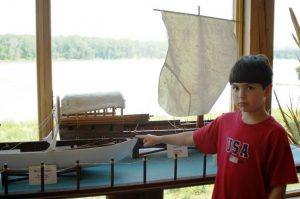Homeschooling without Textbooks
Do you struggle with reluctant students? Or “lazy” students? Are you having trouble hanging in there until the end of the year? Maybe it’s time you reevaluate your methods, rather than giving in and giving up. Have you taken a look at homeschooling with topical studies? Maybe it’s time.
What are Topical Studies?
A friend and I coined the term “topical study” a number of years back to describe something more limited in nature than the “unit studies” that were becoming popular with many homeschoolers. A topical study is more the study of a particular topic within a subject, rather than the “all encompassing” type of study that a unit study often entails. For instance, for much of our 35 years of homeschooling we studied history topically – the Civil War was our topic one year, and the Lewis and Clark Expedition was our topic a different time. These topical studies might cover some other subjects as well, art or music, or science, for instance, but they were primarily designed to deal with a particular topic – for us generally history or science.

Why Topical Studies Make Sense
Real learning involves getting familiar with something and getting comfortable with it! Familiarity and comfort don’t come when one topic after another is thrown at a learner. They come from repetition and context.
We must encounter the same words, the same concepts, the same dates many times before we “own” them, before they become a part of our vocabulary, something that we remember. Textbook teaching does not lead to this kind of ownership very often.
In my humble opinion (my bias will definitely show here) History and Science should be taught exclusively with the Topical Study/Unit Study method through at least eighth grade (though I have to admit to sticking to that method even in high school). Is it too painfully obvious here that I have an aversion to textbooks? It’s not that textbooks are totally worthless, but I would have to say they are often close. Let’s be honest here: How often do you go to a textbook to find the answer to a question? How much of what you endured “learning” through textbooks, do you actually remember? Enough said.

Holt, Gatto, and Harris Weigh in
John Holt (a well-known unschooler back in the days when we began our homeschooling journey) talked about “how children fail” and “how children learn.” He suggested that if we have reluctant and/or lazy students, we should blame our materials and/or our methods, not our students!
And please remember that most of us are basing our methods and materials on the public school systems – because that’s the only thing we know. As John Gatto (a New York City teacher of the year) reminded us in Dumbing Us Down, the public school system is failing, so why are we trying so hard to copy it?
Many years ago, Gregg Harris (a popular homeschool author at the time) proposed “delight directed studies” to take care of the problem of a reluctant student. This can be our delight or their delight. This is a very important point when you start looking at Topical Studies. You need to pick something your family will get excited about.

Da Vinci has been a delight of mine for many years!
What if We Miss Something?
One of the questions often voiced about getting away from textbooks is, “What if I miss something this way, what if I don’t cover something that should have been covered?” My first response when someone asks that question is often, “Covered according to whom?” Contrary to what some folks would lead us to believe, there is no one “correct” curriculum for, say, fourth grade, or sixth grade, or any other grade.
Also, remember that covering material does not equal learning it! There is an important distinction here! Please don’t miss it. With topical studies, we cover less, and learn more.
Aren’t Topical Studies a lot of Work?
Why do we want to go to the “trouble” of topical studies? It is more trouble than just picking up a textbook and going through it. But it is also more effective! It’s more fun! And it’s usually more enjoyable for students and teacher alike!
Topical studies also give siblings something in common: shared knowledge and experiences. We can carry our “school” discussions much beyond the “classroom” this way, since several of us are studying the same thing at the same time. And that includes the teachers, since they are now spending their time preparing a topical study, instead of writing out lesson plans, grading tests, and checking assignments.
Okay, But Now What?
I hope you’re convinced, and that you want to try a topical study. But you may be asking, now what? How do you actually plan the studies?
They don’t have to be long. (Even though ours usually ended up taking up an entire school year or more, they certainly don’t have to!) You might want to start with something small, like a two week study. They don’t have to be involved. And you don’t have to pull them from thin air. A good place to begin is with a topic someone is really interested in. That’s how ours usually begin. The key to successful topical studies is often timing and interest!
Some good science topics to begin with
(But remember, “the sky’s the limit”!)
- Birds
- Bugs
- Butterflies
- 7 Days of Creation
- Creation vs Evolution (we want our children to be critical thinkers!)
- Gardening
- Dinosaurs
- Flowers
- Endangered Animals

Biblical/Christian topics
- Martyrs
- Missionaries
Some good history topics
- Indians (1 tribe/week or month, for example)
- Presidents (1/week, for instance)

Specific Wars
- Revolutionary War
- Civil War
- World War II
Specific Eras
- Renaissance
- Reformation
- Middle Ages – knights, castles…

Geography studies
- States (all 50 – 1 per week, for example)
- Countries (from around the world, or within one continent)
- Continent (maybe 1/month)

Anything else of interest to your family!!!
Once you have a topic, where do you begin?
- The library
- Your own books
- Encyclopedias
- On-line research
- Used books
- Multitudes of catalogs
- Friends
- Experts
I find that once I’ve chosen a topic – the resources practically jump out at me.
Depending on your topic, there may be oodles of free materials available for the asking:
- County Extension Office
- State Tourist Offices
- On-line
- State Welcome Centers
Two of my favorite, inexpensive resources for History, Geography, and Science studies are:
- Dover Coloring Books
- National Geographics
National Geographics have wonderful maps and pictures, and can usually be bought for very low prices at used book stores and places like Salvation Army and Goodwill. (They do need to be edited occasionally.)
Scheduling a Topical Study
Start with a schedule/timeline for your study. Do you want to study the topic for two weeks or two months? Have a starting schedule, but be flexible…If it fizzles out sooner, stop! If you’re having so much fun, you want to continue when your time is up, continue!
One main topic/day works well for us; we incorporate:
- “Lectures” (one of my favorites)
- Read alouds (a favorite for most of the students!)
- Silent reading assignments
- Research Assignments (give written or oral reports)
- Art assignments (could include drawing/collages/sculpture)
- Field trips as we can work them in
History through Topical Studies
With topical studies you can cover U.S. or World History in depth, over the course of many years. Why “cover it all” in one year, again and again, never really going into any detail? With Topical Studies we never covered either World or American History from “start to finish” – but my children have a fairly good knowledge of both through the Topical Studies we have done throughout their many years of study.
In Conclusion
If you haven’t tried topical studies or unit studies with your family, please do. If you have and didn’t like it, please try it again. Your family could benefit greatly from the experience!
This blog post was primarily excerpted from my homeschool book, Topical Studies.
Happy Learning!
Cathy

Leave a Reply